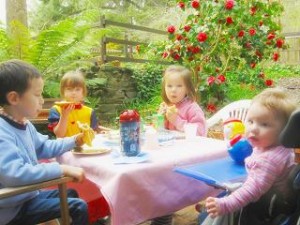Young children face many challenges when they  begin school, including learning to work alongside new friends, navigate in a new environment, and take instruction from unfamiliar adults. For a young child who is unprepared, starting school can be a very stressful situation.
begin school, including learning to work alongside new friends, navigate in a new environment, and take instruction from unfamiliar adults. For a young child who is unprepared, starting school can be a very stressful situation.
As parents, we have the opportunity to give our children experiences that will help them feel prepared for the challenges they will face when they go to school for the first time. In particular, comfort in some key developmental areas can help any child quickly feel at ease in the classroom. These areas include: social skills, listening skills, fine and gross motor skills, visual discrimination skills, and independence skills.
A simple way to begin helping your child is to objectively assess his existing skill set in each of these important developmental areas. The internet offers many wonderful free kindergarten readiness tests that you can complete to quickly gain a sense of your child’s existing skill level. With this knowledge, you can more easily tailor activities in each of the following five areas.
1) Social Skills
Children need to have opportunities to play with other children, learning that they must compromise, share materials, and take turns. Arrange play dates for your child to give him to the chance to learn these important social skills. Talk to him before the play date to help him understand the desired behavior you expect. Let him know that he may sometimes get to play with the toy or game he desires and at other times he may need to go along with his friend’s ideas or let another child have a turn.
2) Listening Skills
Help your child understand the importance of following directions when another person speaks to him. Try to avoid repeating directions yourself so that your child gets into the habit of listening the first time. Engage your child in activities that require him to follow directions, such as helping to set the dinner table or picking up his toys.
3) Fine and Gross Motor Skills
Children will feel comfortable in a school setting if they feel comfortable with their bodies. Moving confidently on the playground or in a gymnasium will help a child interact comfortably in play situations. Obviously, some children are naturally more adept at gross motor activities than other children. But opportunities to play on jungle gyms, swings, and with large balls, for example, will help any child hone these skills.
Holding a pencil correctly and using it to write or draw with precision will go a long way to helping a child feel at ease with many preschool and kindergarten classroom activities. A proper pencil grip must be specifically taught to children since children often resort to a fist grip when grabbing a pencil. Show your child how to pinch the pencil between the pointer finger and thumb and rest the pencil on his middle finger for support.
Fine motor skills develop with lots and lots of practice. Keep some of your child’s early work and date it. Then, several weeks later, you can compare this early work to his current products so that he can appreciate his progress.
4) Visual Discrimination Skills
Visual discrimination skills come into play constantly during a school day. When children recall new faces in their classroom, recognize their individual cubby hole, and learn to name letters and numbers, for example, they are relying on their ability to recognize and identify details in visual images.
Games and fun worksheets are ideal ways to help your child hone this important skill. Play “I Spy” with your child, naming items to be “spied” with increasing detail. At first, you may spy something “red and round” such as a ball. Later, see if your child can find a less obvious item. You can play this game anywhere and at anytime when you have just a few spare moments to fill. Strong visual discrimination skills will help prepare your child to recognize the difference between an O and a Q, a P and an R, or a 3 and an 8, or example, when the times comes in school for him to learn the alphabet and numbers.
5) Independence Skills
Allow your child to do things for himself. I know that it is often easier to do a chore for your child than wait and watch as he struggles to do it himself. As with all skill development, however, only practice, practice, and more practice can help a child learn to do things for himself. He will feel confident and proud when he dresses himself, helps himself to a snack, makes his own bed, or hangs up his own coat, for instance.
Finally, give your child opportunities to be away from you for small periods of time. He may be scared or timid at first, but he will soon learn that you come back and that he is okay in a safe place without you. The ability to separate without undue anxiety will be very important when he begins school.
Helping your child to hone skills in these five developmental areas will prepare him to embrace the challenges of preschool and kindergarten eagerly and confidently.
Renee Abramovitz is a recently retired preschool and kindergarten teacher, mother to three grown children, and grandmother to four, school-aged little boys. Renee shares her knowledge about preschool and kindergarten readiness issues at www.schoolsparks.com where she offers over 500 free kindergarten worksheets for use by parents with their children.
 Posts
Posts